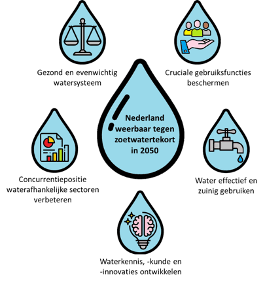The Netherlands will have more and more dry periods in the future. They could lead to water shortages in areas such as drinking water supplies, nature, shipping and industry. The aim of the measures in the Freshwater Delta Decision is to make the Netherlands resilient to freshwater shortages by 2050.

National goals for freshwater supplies
Resilience to freshwater shortages is the overarching objective of the five national objectives for freshwater supplies that were established in 2015 in the Delta Programme:
- A healthy and balanced water system
- Protecting critical user functions
- Using water effectively and economically
- Developing knowledge, expertise and innovations in the water domain
- Improving the competitive position of water-dependent sectors
Priority sequence
Measures are needed to make the Netherlands resilient to freshwater shortages. The Delta Programme ties into the priority sequence in the National Environmental Vision (NOVI). The objectives are to safeguard water availability and prevent problems with excessive water. How?
The guiding principles are:
- Taking water availability into consideration in spatial planning and land use
- Using water more economically
The next element is threefold in nature:
- Retaining water better and storing it in the soil and in buffers
- Distributing water in intelligent ways
- Accepting damage/residual damage
Developments in 2015-2025
In recent years, important steps have been taken in the implementation of the Freshwater Delta Decision, both at the national level and in the freshwater regions. Most of the measures in the first phase (2015-2021) have now been completed. Four measures from this phase will remain in 2026. These projects will be completed no later than 2027.
The measures in the second phase (2022-2027) are in full swing. However, the implementation of some planned measures is increasingly behind schedule. This is due in part to additional costs due to inflation, complex procedures, the cessation of the National Programme for Rural Areas (NPLG), opposition to land purchases and capacity problems due to a tight labour market. In the meantime, these delays are exacerbating the risk of damage due to water shortages and the measures are becoming more expensive. The partners are therefore now giving high priority to the implementation of promising projects. Funds released from deferred projects that have not yet started, and from projects that have cost less, such as the KWA+, have been used for this purpose.
Improving resilience to drought
During the 2018 drought, ‘smart water management’ made it possible to mitigate water shortages and their effects. In December 2019, the Drought Policy Platform delivered its final report (Dutch) ‘The Netherlands more resilient to drought’. The conclusion: a change is needed to make the Netherlands more resilient to drought. The capacity of the water system to retain water has to improve at all levels. In some areas, this will require changes in land use.
Integration
The Freshwater Delta Programme is seeking intensive national and regional coordination with, inter alia, the National Spatial Policy Document, provincial spatial plans, the Main Energy Structure Programme (PEH) and the regional Delta Programmes such as those for the IJsselmeer area and Southwest Delta. Particular attention is being paid to the connection with the Delta Programme for Spatial Adaptation, for example in the new generation of stress tests, which assess problems with excessive water and water shortages in conjunction. That is because measures to manage water shortages by retaining water may exacerbate the risk of problems with excessive water. In the case of measures in the main water system, the Freshwater Delta Programme is seeking synergy between the agendas for fresh water, problems with excessive water and accessibility through the main waterway network.
Planning through to year-end 2027
Projects, activities and milestones
The years ahead will be devoted to the implementation of the Freshwater Delta Decision.
Some milestones during this period include:
- The final measures of the first phase of the Freshwater Delta Plan (2015-2021) will be completed in 2027. These include the natural restructuring of the Dwarsdiep area, the strengthening of the Frisian IJsselmeer coast, the navigability subsidy scheme as part of the implementation of the 2018 IJsselmeer Area Water Level Decree and the increase in the Noordervaart water influx.
- Work is taking place on the measures for the second phase of the Freshwater Delta Plan (2022-2027), although completion is proceeding more slowly than planned. The Freshwater Delta Programme is testing future strategies and measures for the period after 2027 so that they will be resilient until at least 2050.
- The Delta Programme is formulating the freshwater objectives for the third period (2028-2033) in more concrete terms and amending them on the basis of regional observations. They will be included in the ongoing process for the periodical evaluation of the 2026 delta decision.
- The Climate-Resilient Freshwater Supplies in the Main Water System strategy (KZH) is being developed step by step. The KZH will set out the options in late 2025: to what extent and until when can the current optimised main water system meet freshwater demand from the different regions?
- The collaboration with the Delta Programme on Spatial Adaptation is being further strengthened.
- In 2025 and 2026, the Freshwater Delta Programme and the Room for the River 2.0 programme (RvdR 2.0, formerly Integrated River Management), in consultation with the relevant regional sub-programmes, will work on a proposal for the national discharge distribution in the rivers when water levels are low.
Knowledge and research
Knowledge about fresh water will be kept up-to-date with the knowledge agendas of the Delta Programme and the Freshwater Delta Programme. The Freshwater knowledge agenda will be updated every year. The results of studies and pilot projects are shared at knowledge days and during national and regional presentations.
The Sea Level Rise Knowledge Programme presents the implications of the various scenarios for sea level rise with regard to freshwater availability and land use (for agriculture and nature, for example).